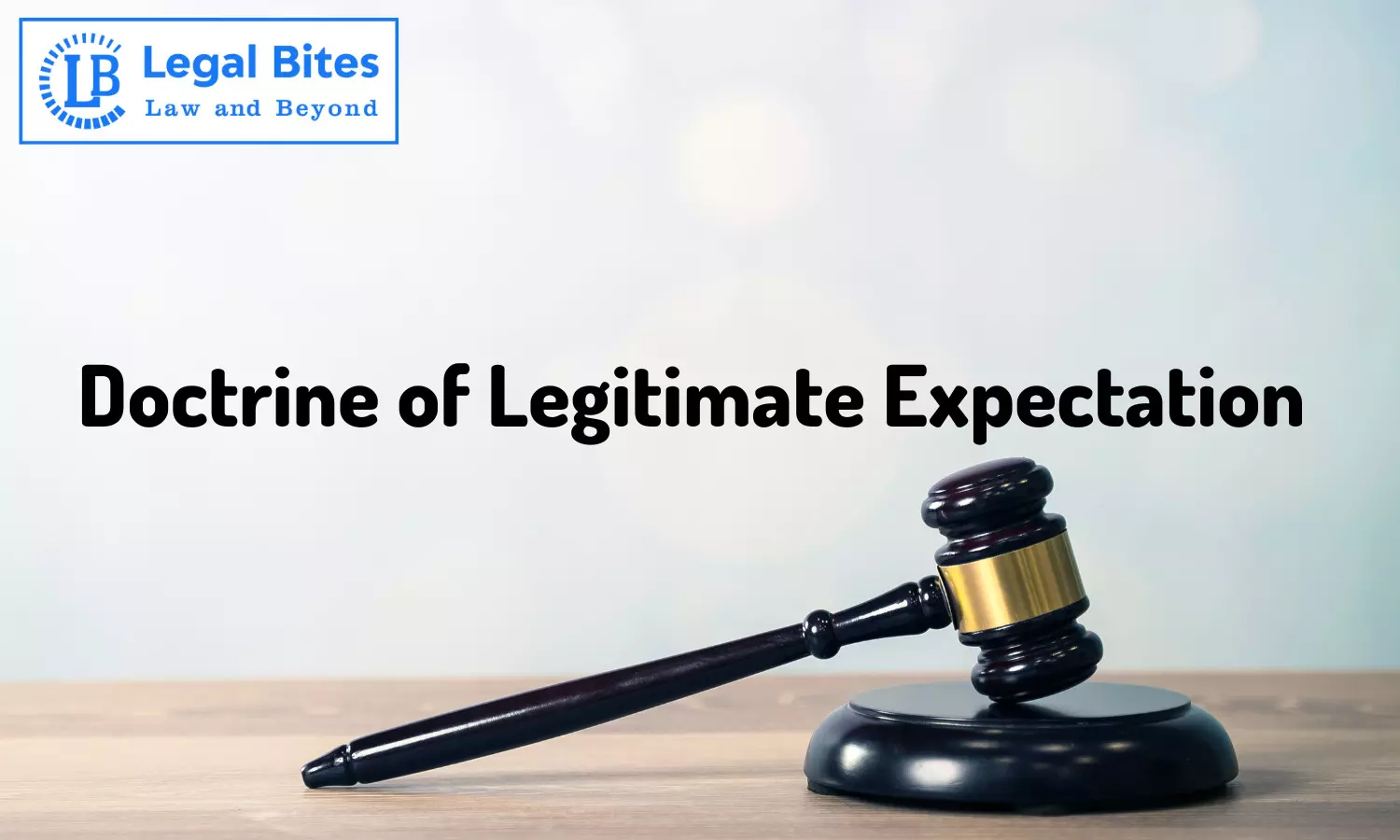Doctrine of Legitimate Expectation
The article 'Doctrine of Legitimate Expectation' deals with this doctrine and its origin in India and foreign law.

The article 'Doctrine of Legitimate Expectation' deals with this doctrine and its origin in India and foreign law. A legitimate expectation is a reasonable expectation that a person would be treated a specific way by public authorities due to a pattern of behaviour or an explicit commitment made by the authority in question. In this case, a public employee is responsible in place of reasonable expectations. This doctrine covers the relationship between a person and a public authority....
The article 'Doctrine of Legitimate Expectation' deals with this doctrine and its origin in India and foreign law. A legitimate expectation is a reasonable expectation that a person would be treated a specific way by public authorities due to a pattern of behaviour or an explicit commitment made by the authority in question. In this case, a public employee is responsible in place of reasonable expectations. This doctrine covers the relationship between a person and a public authority. This notion covers the practice of public law.
Introduction
The concept refers to a person's reasonable expectation that they would be treated in a particular way by public authorities due to a consistent pattern of behaviour or an express promise made by the relevant authority. The origins of this theory can be found in English law, where it was adopted as a basis for judicial review in administrative law to safeguard substantive and procedural interests when a public authority revoked a representation made to a person. The natural fairness principle evolved into the doctrine of justifiable expectation.
The goal of the legitimate expectation concept is to hold public officials accountable for performing their duties and acting fairly by considering all pertinent factors. Additionally, it imposes an obligation on the public authority to refrain from acting in violation of a legitimate expectation unless there is a valid public policy justification for doing so.
Fortune Case
The doctrine developed under the French Legal system was comprehended as droit administratif. Counseil d’Etat applied this doctrine (in French “protectio de la confiance legitime”) in this famous case. The appellant desired to take part in a competitive exam. He was denied permission to testify because his confidential file contained some disparaging statements. The appellant ordered Conseil d'Etat to examine the files and ask the Secretary to defend the order. The Secretary argued that because it was an “Act de Government” (Act of State), the Court lacked the authority to hear the case. He offered no supporting documentation. The Court issued an order requiring the production of the complete file about the matter, reviewed it, and then revoked the order.
The Rule of Law governs England because it does not permit ordinary courts of law to challenge any “Act of State” of ministerial discretion or access to private records. It was decided that the administration must exercise caution to avoid putting innocent people in a bad situation by abruptly altering the rules that are being implemented or how it behaves unless doing so is necessary for the good of the community.
The administration is free to reverse its choices, but it must take the necessary precautions to guarantee that individuals who would likely be impacted are notified beforehand. The UK, Australia, South Africa, Hong Kong, Singapore, New Zealand, Canada, and India have also come to adopt this doctrine.
Judicial Developments of Legitimate Expectations in India
The doctrine of legitimate expectation has grown in India in accordance with the standards established by common law English courts. In actuality, it was via these English instances itself that the doctrine first gained acceptance by Indian courts.
In India, State of Kerala v. Madhavan Pillai, (1989), is the case where this doctrine was first mentioned. In this case, the respondents had received approval from the government to build new aid schools and renovate those buildings that already existed. But after 15 days, an instruction was given to continue delaying the sentence. Because it went against the fundamentals of natural justice, this action was contested. The SC ruled that the second order breached the legitimate expectations that the sanction order had given rise to in the respondents because it did not meet the rules of natural justice, which is enough to invalidate an administrative order.
Origin and Development of Doctrine of Legitimate Expectation in English Law
The natural fairness principle evolved into the doctrine of legitimate expectation. When a public authority retracts a representation made to a person, this notion, which can be traced back to English law, was adopted as a basis for judicial review in administrative law to preserve the person's procedural and substantive interests.
In the case of Council of Civil Service Unions and Others v. Ministry for the Civil Service, [1984] UKHL 9, it determined that to create this theory, the public authority's decision had to change the person's rights or responsibilities that were enforceable by or against him and deprive him of some benefits or advantages. Its purpose is to give effect to the hearing or failure to conduct a hearing, and it is invoked to increase the right to be heard.
Article 14 and Legitimate Expectation
The principle of natural justice covers the right to hear, or in Article 14 of the Indian Constitution. To determine if a genuine expectation was denied, nonarbitrariness and unreasonableness are essential. Article 14 has a strong emphasis on the reasonable or genuine expectation that every person would be treated fairly in interactions with public authorities.
There are two types of Legitimate Expectations:
Procedural Legitimate Expectation: When the decision-makers commit to considering certain factors during the decision-making process, the procedural legitimate expectation is created. when a specific procedure is routinely used and the court determines that stopping the practice would be unjust or inconsistent with good administration.
Substantive Legitimate Expectation: This legitimate expectation occurs when the decision-maker has pledged to uphold a current policy or to take specific actions on behalf of a particular organisation or party and would be negatively impacted by choice to break that promise.
Landmark Cases on Doctrine of Legitimate Expectation
1. M.P. Oil Extraction v. State of M.P., (1997) 7 SCC 592)
In the case, the Supreme Court was addressing some industries' concerns regarding licence renewal. It was determined that the State's decision to extend an invitation was not arbitrary and that the chosen industry had a reasonable expectation that the renewal claims would renew its licence.
2. Kuldeep Singh v. Govt of NCT of Delhi, (2006 SCR SUPP 3 335)
The State could not have disregarded the applications submitted by the appellants in this case after the High Court ordered the State to do so on identical terms and conditions. Given the State's policy decision, the applicants had a genuine expectation of receiving licences. Hence, the State could not have refused to issue such licences.
3. PTR Exports (Madras) Pvt. Ltd And others v. Union of India and others, (AIR 1996 SC 3461)
In this case, it was observed that the doctrine of legitimate expectations has no bearing on decisions made by the appropriate authorities according to an executive order or the law itself, and the government is not prevented from enacting new policies as and when necessary to serve the public interest.
4. Union Of India And Others v. Hindustan Development Corporation And Others, (1994 AIR SC 988)
The Supreme Court carefully thought out the reverence of this theory. The concept does not, in the opinion of the Supreme Court, contain any rights that have been crystallised. The principle is largely limited to the right to a fair hearing before any judgement is made, and it provides the applicant with a good enough reason to ask for judicial review.
5. Kerala State Beverages (M and M) Corporation Limited v. P.P. Suresh & Ors Etc., (Civil Appeal Nos. 7804-7813 of 2019)
The claim of a legitimate expectation must be seriously considered, while the overriding public interest may be a factor in the government changing its policy.
6. MRF Ltd Kottayam v. Asst Commissioner, Sales Tax, Appeal (civil) 1610 of 2006
In the present case, it has been held that even though a person might not have a private law right to a certain type of treatment, they may nonetheless have a legitimate expectation of it from an administrative authority. A representation or promise made by the authority, including an implied representation or a pattern of consistent behaviour in the past may both give birth to the expectation.
7. Madras City Wine Merchants’ v. State of Tamil Nadu and Anr., (1994 SCC 5 509)
In this case, factors that could give rise to legitimate expectations were hypothesised. The factors are (i) If the administrative body made any express promises or representations. (ii) That such a promise was unmistakable and plain. (iii) The existence of a reliable pattern from the past that the person can fairly anticipate will continue to function.
Conclusion
The Doctrine of legitimate expectations is a welcome addition to the tools available to courts for guaranteeing impartial judgment. It is important to prevent the popular phrase “legitimate expectation” from degenerating into a vague foundation for judicial involvement. Some contend that reasonable expectations should only apply to rights that are procedural, not substantive. Since the court is primarily interested in the decision’s process and not its fairness, procedural protection only has a minor effect on the administrative autonomy of the relevant public authority. As a result, public authorities’ complete authority is never in danger. The courts might examine the decision's merits by substantively applying legitimate expectations. Any interference with the public authority's discretion would go beyond their constitutionally mandated authority and their proper responsibilities.
References
[1] Doctrine of legitimate Expectation, Available Here
[2] Sarica AR, Doctrine of legitimate expectation, Available Here
[3] State of Kerala v. Madhavan Pillai, AIR 1989 SC 49
[4] Nikita Batra, Doctrine of legitimate Expectation, Available Here
Important Links
Law Library: Notes and Study Material for LLB, LLM, Judiciary, and Entrance Exams

Tanmay Mehra
Tanmay Mehra is a law graduate with a Bachelor's in Business Administration and Law (B.B.A.LL.B.) from National Law University Odisha, Cuttack. Currently, she is aspiring to crack the Judicial Service examination.
